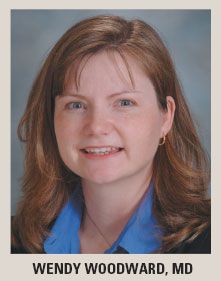Results may be biased
The [Godinez study] referral pattern for MRI represents a bias in this study population toward young women and women with ambiguous findings on routine imaging, who are not necessarily the same patients referred for APBI, said Dr. Woodward, assistant professor of radiation oncology at M.D. Anderson Cancer Center.

The [Godinez study] referral pattern for MRI represents a bias in this study population toward young women and women with ambiguous findings on routine imaging, who are not necessarily the same patients referred for APBI, said Dr. Woodward, assistant professor of radiation oncology at M.D. Anderson Cancer Center. She also said the cohort included 13 patients who received neoadjuvant chemotherapy, making them ineligible for APBI, which may further bias these results.
“It would be helpful to have a validation of these data in a cohort of women without an underlying indication for MRI referral, to confirm the usefulness of this modality in the general population of breast cancer patients eligible for APBI,” she said.
Also, APBI efficacy data primarily exists for selected groups of women. “A similar study of breast MRI among these selected groups would assist in determining the true cost-benefit ratio for MRI in APBI,” Dr. Woodard said. “It is premature to suggest that incorporation of MRI would make APBI universally acceptable for women of this cohort with single lesions.”
Click here to read the original article.